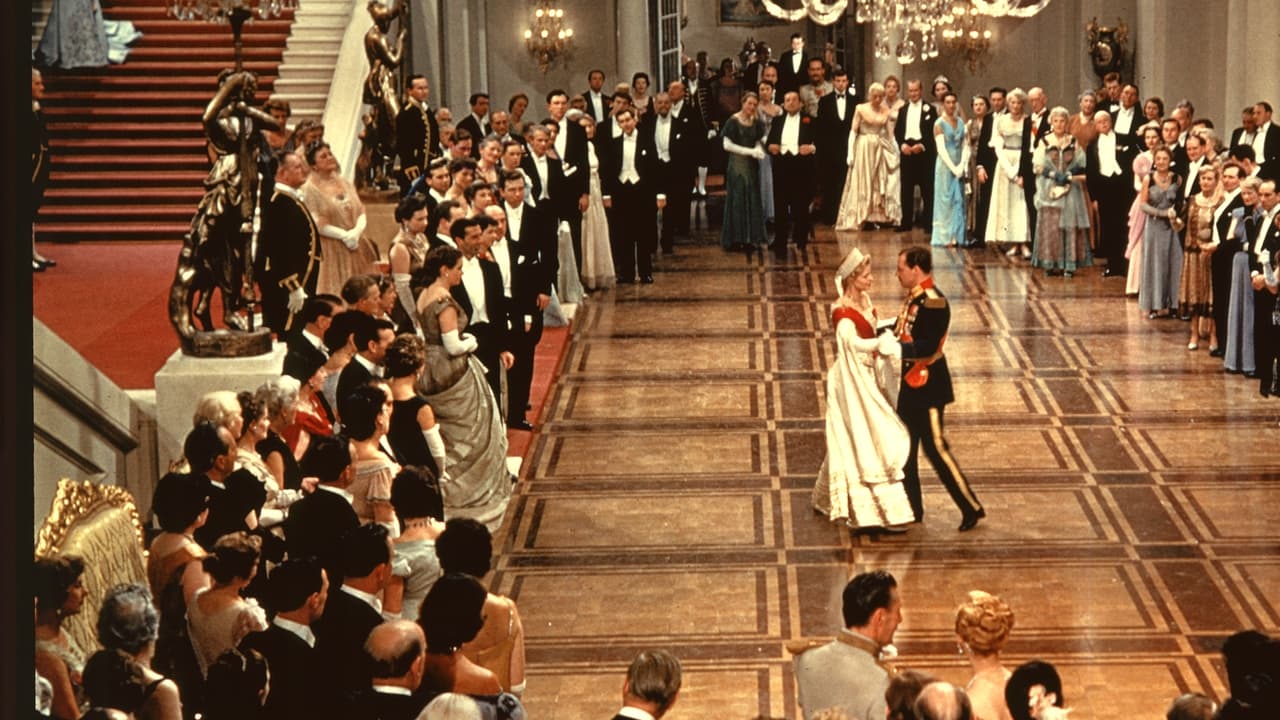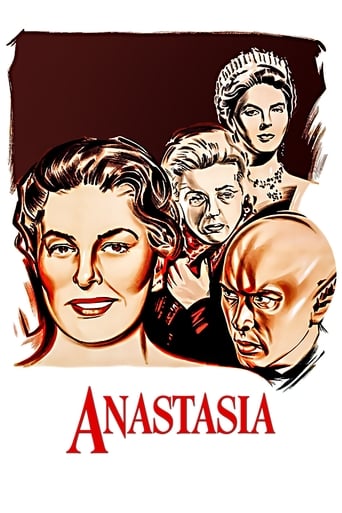Mischa Redfern
I didn’t really have many expectations going into the movie (good or bad), but I actually really enjoyed it. I really liked the characters and the banter between them.
Roy Hart
If you're interested in the topic at hand, you should just watch it and judge yourself because the reviews have gone very biased by people that didn't even watch it and just hate (or love) the creator. I liked it, it was well written, narrated, and directed and it was about a topic that interests me.
Kirandeep Yoder
The joyful confection is coated in a sparkly gloss, bright enough to gleam from the darkest, most cynical corners.
Guillelmina
The film's masterful storytelling did its job. The message was clear. No need to overdo.
TheLittleSongbird
Sure, 'Anastasia' may be inaccurate, especially with DNA and forensics confirming the real fate of Princess Anastasia around 2007 (well after the numerous film adaptations based on the fascinating "what if" story were made, of which this is one). This said, it is a well done and interesting, if imperfect film on its own merits.While it is not quite one of her best performances (in a career that includes her timeless performances in 'Casablanca' and 'Gaslight'), Ingrid Bergman is nonetheless exceptional in the title role, bringing equal vulnerability and dignity with intelligence, poise and nuance. People will argue whether she deserved the Oscar or not, part of it may be due to it being a comeback performance or for personal reasons but also the Academy could also have thought it that good a performance, personally have nothing against her winning while thinking that she has been better.Yul Brynner is similarly very good, portraying Bounine with some subtle menace but also authority, wit and likability. If 'Anastasia' was released in a different year to his Oscar-winning turn in 'The King and I' (a case of him dominating that film in a more colourful role than here, and the chemistry between him and Deborah Kerr was stronger than between Bergman) he would most likely have gotten some kind of award nod (not since 1942 with Teresa Wright in 'The Pride of the Yankees' and 'Mrs Miniver' was the same actor nominated in the same year for more than one film).One mustn't overlook Helen Hayes (also in a "comeback" performance though for different reasons to Bergman, having suspended her career due to her daughter's death and her husband's health), who gives a powerful and poignant performance as the Empress, a role so far removed from her usual roles. If there was one performance that deserved an Oscar or at least a nomination it was Hayes, and that she didn't is something of an enigma. Nor the delightful scene-stealing of Martita Hunt.The acting is not the only reason to see 'Anastasia'. The film is very well made, with exquisitely opulent costumes that give a real sense of time and place, sumptuous scenery of London, Copenhagen and Paris and positively luminous cinematography. Alfred Newman's music score is one of his most stirring and beautifully orchestrated, in a career full of scores of both those qualities.Much of the script is witty, literate and clever, if at times a bit rambling, largely succeeding too in putting flesh on the bones. Most of the story is gripping, helped by that the story it's based on is one of the most intriguing there is, especially telling are the scenes between Bergman and Hayes, very powerfully written, emotional and beautifully performed by both actresses.'Anastasia' for all these great things is not perfect. The ending does feel abrupt and it felt somewhat of a cheat for the point of the story to be left ambiguous. It may have been due to being careful not to offend but this was a kind of story that deserved to have that question answered, and to be perfectly honest ambiguous/open to interpretation endings tend to generally not do it for me.Was expecting more chemistry between Bergman and Brynner, which comes alive in the dialogue and the delivery but not on screen between them. It's all well played and competent with some wit, but one misses the fire, love and passion which was clearly meant to be there but doesn't quite come alive here. Some of the pacing drags too, with the workmanlike and sometimes impressive but too often undistinguished and too measured direction not helping.Overall, not perfect but interesting and very well done on the whole. 7/10 Bethany Cox
cricket crockett
. . . (in which a ragtag group of society's "losers" decided to test whether Darwin's Survival of the Fittest applied to human beings) serves as the historical context for ANASTASIA. In 1918 the Russian serfs rounded up their God-appointed czar, his extended family, and a few hundred thousand of their closest friends--and shot them all in the head. "Natural Selection" bred this "privileged" class--the few survivors of which comprise the characters of ANASTASIA--up to the top of the food chain, but the peasant firing squads quickly lopped off their pyramid's pinnacle. Ingrid Bergman's and Yul Brynner's characters both straddle the fence between the dead nobility and the live serfs for the first 100 minutes of ANASTASIA. In the last five minutes they decide to go off Serfing together, which is Hollywood's final answer to the American Experiment known as the U.S. Congress. Despite the Russian peasants proving that Darwinism did NOT apply to humans, Congress persisted in acting otherwise well into the 21st Century. In its hubris, it banned Bergman from Hollywood for eight years on "morals" charges (which is like the sewer pointing out a small spot on the bathroom rug), while also blacklisting the top Hollywood screenwriters for questioning Classical Darwinism (which mandates that America be governed on a "one dollar, one vote" basis, as opposed to the democratic ideal of "one person, one vote"). The brave cast and crew of ANASTASIA flipped the bird at the U.S. Congress in 1956. Maybe American voters will finally catch up with Hollywood in 2014.
n-mo
"Anastasia" is not a film for everyone. Those who insist on historical accuracy in films depicting real people and events would do best to stay away from the movie house altogether. "Anastasia," however, is not exactly about real people, although it does incorporate the lives of real humans and parallels with their true stories to depict a compelling "what-if" scenario and this is incredibly effective, even after DNA tests have revealed that "Anna Anderson" was definitely not Anastasia Nikolavena Romanov but instead, in all likelihood a Kashubian factory worker. (I am unaware whether she ever used the name "Anna Koreff.")As a matter of fact, those who are familiar with the real story are in for an even grander treat. We are thrown into 1928 Paris with a brief shot of this wretched madwoman at Russian Easter, lonely and rejected outside the Russian Orthodox Cathedral and on the brink of suicide, and we are definitely prepared to think of see as the impostor that "Anna Anderson" was. Yet as the film progresses, we are shown a woman quite literally without any past. Michael Thornton opined of the real "Anna Anderson," "Somewhere along the way she lost and rejected (Kashubian factory worker Franziska) Schanzkowska. She lost that person totally and accepted completely she was this new person."Ingrid Bergman's Anna Koreff, however, is not simply mentally lost: the world has lost her as well. It helps, perhaps, that Bergman is infinitely more convincing as a princess than as a vagabond, and the retrospective certitude of the falsity of "Anna Anderson"'s claim helps to disguise her limits at the beginning of the film when, like Yul Brynner's General Bounine, we are meant to doubt her identity. Bounine creates Koreff's new identity as the Grand Duchess Anastasia, and so effectively that he begins to believe in it himself. But the entirely unsolvable questions remain:Is Anna Koreff Anastasia? Does she actually believe she is Anastasia? More ominously, whoever she is, does she even truly and consciously remember?This piece carefully avoids resolving these questions. On the one hand, the speed and thoroughness with which she slides into her new role is difficult to explain and impossible to deny. On the other hand, the ending (among other things) is cleverly constructed so as to expose her assumed royal identity as a construction. This is not, of course, the real story, and in the post-1900 world, such a thorough and complete break with any sort of past anchor is next to impossible. But if it happened... this may be just how it happened."Anastasia" is above all a beautifully designed film, full of elegance and taste. Ingrid Bergman is as beautiful as the interior architecture against which she assumes her royal identity. Again, it is not a film for everyone: many will have great difficulty connecting and sympathizing with the royal circles and personalities in this tome, but those who are able to understand pre-modern, pre-liberal (c.f. human) sensibilities will love it. Helen Hayes is absolutely perfect and inspiring as the Dowager Empress Maria Feodorovna (it is plain to see how the real Empress was so beloved in her adopted Russia), and her chemistry with Bergman is incredible to behold. The only thing I can find to critique is that the script--and to some extent a steely wall between Bergman and Brynner--does not fully back up the eventual culmination of the relationship between Koreff and Bounine; the conclusion fits quite well thematically but is mildly illogical with regard to the plot. Still, this is a minor complaint, as "Anastasia" is first and foremost a film about identity, and one that will jar and confound its viewers time and again.
moonspinner55
Critics were too quick to applaud this musty adaptation of Marcelle Maurette's play starring Ingrid Bergman as a rag-woman picked by crafty businessman Yul Brynner to be groomed into Russian royalty Anastasia, a Duchess long though deceased. Helen Hayes is exceptionally good as the cautious Dowager Maria, whom Ingrid must work hard to convince, however Bergman herself (despite winning a Best Actress Oscar for this 'comeback' performance) is mannered, and she has no on-screen rapport with Brynner whatsoever. As a result, the romantic underpinnings of the story do not come off, and the thin plot keeps going after all its pieces have already come into play. The production is appropriately opulent, but the film isn't especially moving or memorable. ** from ****

